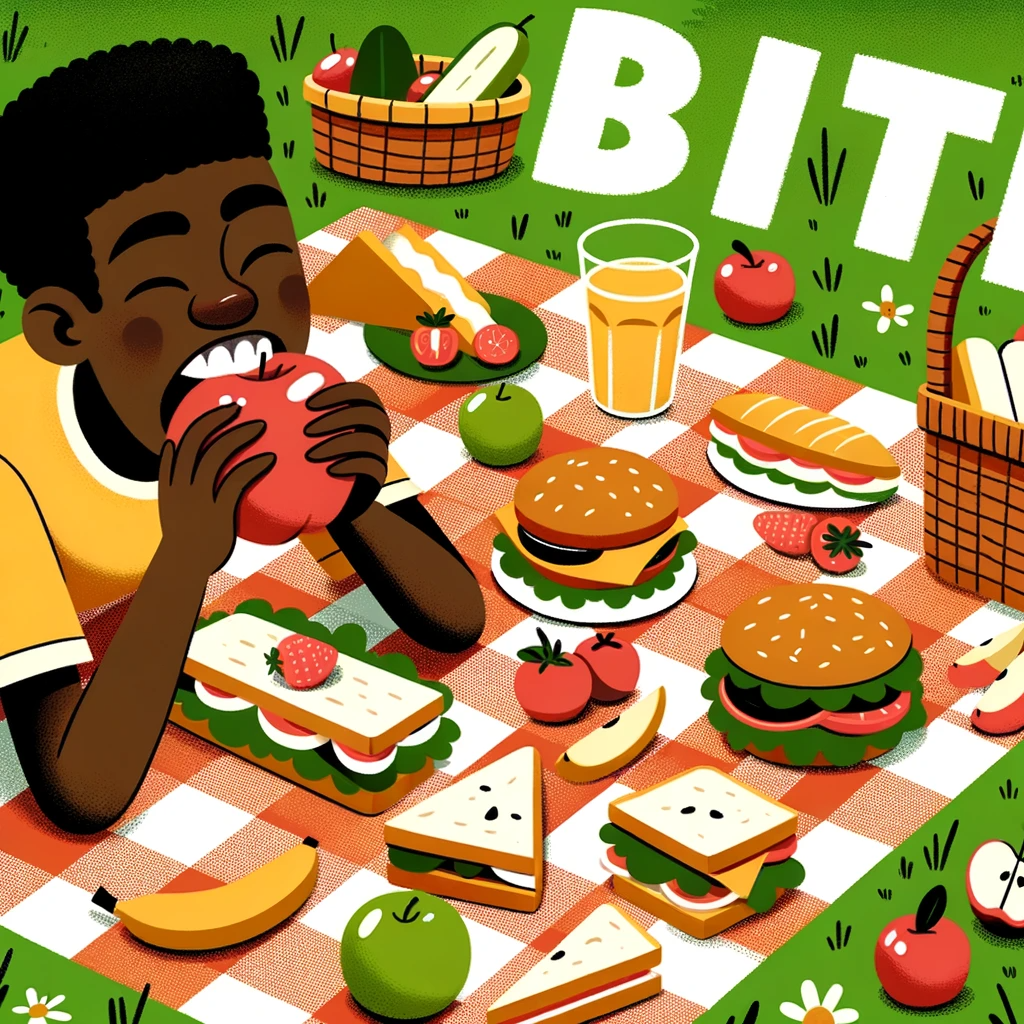Bite
Definition
Bite can function as both a verb and a noun. As a verb, it means to use the teeth to cut into something or to grip onto it. As a noun, it refers to an act of biting, the mark left by a bite, or a small piece of food.
Parts of Speech
- Verb
- Noun
Pronunciation
American English
- IPA Pronunciation: /baɪt/
- Respelling: b-eye-t
British English
- IPA Pronunciation: /baɪt/
- Respelling: b-eye-t
Etymology
The word "bite" originates from the Old English term "bītan," meaning "to pierce" or "to bite," which is derived from the Proto-Germanic "*bītaną" and Proto-Indo-European "*bheid-" (to split). This word has been used since ancient times to describe using the teeth to cut into or grip something.
Derivatives
- Bitten (adjective)
- Biting (verb)
- Bite-sized (adjective)
- Unbitten (adjective)
- Bit (noun)
Synonyms
- Nibble
- Chew
- Chomp
Antonyms
- Release
- Let go
- Spit out
Usage
The term "bite" is commonly used in reference to eating or gripping, as well as in figurative language. For example, "She took a big bite of the sandwich," or "The cold wind had a sharp bite."
Related Terms
- Chew: To use teeth to grind food.
- Grip: To hold onto something firmly.
- Nibble: To take small, gentle bites.
Detailed Definitions
Verb
- To cut or grip with the teeth: Refers to using teeth to cut into or hold onto something.
- Example: "The dog bit into the toy with enthusiasm."
- To cause a stinging or painful sensation: Often used figuratively to describe the effects of cold or sharp sensations.
- Example: "The icy wind bit into her face."
Noun
- An act of biting: Refers to using teeth to cut or grip something.
- Example: "She took a bite of her apple."
- A small amount of food: Often used to describe a small portion of food or a light meal.
- Example: "They stopped to grab a quick bite to eat."
- A sharp or stinging effect: Used to describe something with a strong impact, often in a figurative sense.
- Example: "There was a bite to the air on a chilly winter day."
bite


.png)
Mandarin (🇨🇳)
- Meaning 1 (to use teeth): 咬 (yǎo)
- IPA Pronunciation: /jɑʊ̯˧˥/
- Respelling: yao
- Meaning 2 (small amount of food): 一口 (yī kǒu)
- IPA Pronunciation: /iː˧˥ kʰoʊ̯˨˩˦/
- Respelling: yi kou
Hindi (🇮🇳)
- Meaning 1 (to use teeth): काटना (kāṭnā)
- IPA Pronunciation: /kɑːʈ.naː/
- Respelling: kaatna
- Meaning 2 (small amount of food): निवाला (nivālā)
- IPA Pronunciation: /nɪˈwaː.laː/
- Respelling: nivala
Spanish (🇪🇸)
- Meaning 1 (to use teeth): morder
- IPA Pronunciation: /ˈmor.der/
- Respelling: mor-der
- Meaning 2 (small amount of food): bocado
- IPA Pronunciation: /boˈkaðo/
- Respelling: bo-cado
French (🇫🇷)
- Meaning 1 (to use teeth): mordre
- IPA Pronunciation: /mɔʁdʁ/
- Respelling: mor-dr
- Meaning 2 (small amount of food): bouchée
- IPA Pronunciation: /bu.ʃe/
- Respelling: bu-she
Modern Standard Arabic (🇸🇦)
- Meaning 1 (to use teeth): عض (ʿaḍa)
- IPA Pronunciation: /ʕaðʕa/
- Respelling: 'adha
- Meaning 2 (small amount of food): لقمة (luqma)
- IPA Pronunciation: /luqma/
- Respelling: luqma
Bengali (🇧🇩)
- Meaning 1 (to use teeth): কামড়ানো (kāmṛānō)
- IPA Pronunciation: /kaːmɽano/
- Respelling: kamrano
- Meaning 2 (small amount of food): নিবেড়ি (nibeṛi)
- IPA Pronunciation: /nibɛɽi/
- Respelling: nibedi
Russian (🇷🇺)
- Meaning 1 (to use teeth): укусить (ukusit')
- IPA Pronunciation: /ʊˈkusʲɪtʲ/
- Respelling: ukusit'
- Meaning 2 (small amount of food): укус (ukus)
- IPA Pronunciation: /ʊˈkus/
- Respelling: ukus
Portuguese (🇵🇹)
- Meaning 1 (to use teeth): morder
- IPA Pronunciation: /ˈmɔɾ.ðɨɾ/
- Respelling: mor-der
- Meaning 2 (small amount of food): mordida
- IPA Pronunciation: /mɔɾˈði.ðɐ/
- Respelling: mor-dida
Indonesian (🇮🇩)
- Meaning 1 (to use teeth): gigit
- IPA Pronunciation: /ˈɡigit/
- Respelling: gigit
- Meaning 2 (small amount of food): gigitan
- IPA Pronunciation: /ˈɡigitan/
- Respelling: gigitan
German (🇩🇪)
- Meaning 1 (to use teeth): beißen
- IPA Pronunciation: /ˈbaɪ̯sn̩/
- Respelling: bai-s
- Meaning 2 (small amount of food): Bissen
- IPA Pronunciation: /ˈbɪsən/
- Respelling: bissen
Japanese (🇯🇵)
- Meaning 1 (to use teeth): 噛む (kamu)
- IPA Pronunciation: /ka.mɯː/
- Respelling: kamu
- Meaning 2 (small amount of food): 一口 (hitokuchi)
- IPA Pronunciation: /hito.kut͡ɕi/
- Respelling: hito-kuchi
Vietnamese (🇻🇳)
- Meaning 1 (to use teeth): cắn
- IPA Pronunciation: /kən˧˥/
- Respelling: can
- Meaning 2 (small amount of food): miếng
- IPA Pronunciation: /miəŋ˧˥/
- Respelling: mieng
Korean (🇰🇷)
- Meaning 1 (to use teeth): 물다 (mulda)
- IPA Pronunciation: /mul.da/
- Respelling: mul-da
- Meaning 2 (small amount of food): 한 입 (han ip)
- IPA Pronunciation: /han ip/
- Respelling: han ip
Turkish (🇹🇷)
- Meaning 1 (to use teeth): ısırmak
- IPA Pronunciation: /ɯsɯrˈmak/
- Respelling: isirmak
- Meaning 2 (small amount of food): lokma
- IPA Pronunciation: /lokˈma/
- Respelling: lokma
Urdu (🇵🇰)
- Meaning 1 (to use teeth): کاٹنا (kāṭnā)
- IPA Pronunciation: /kɑːʈ.naː/
- Respelling: kaatna
- Meaning 2 (small amount of food): نوالا (nivālā)
- IPA Pronunciation: /nɪˈwaː.laː/
- Respelling: nivala





